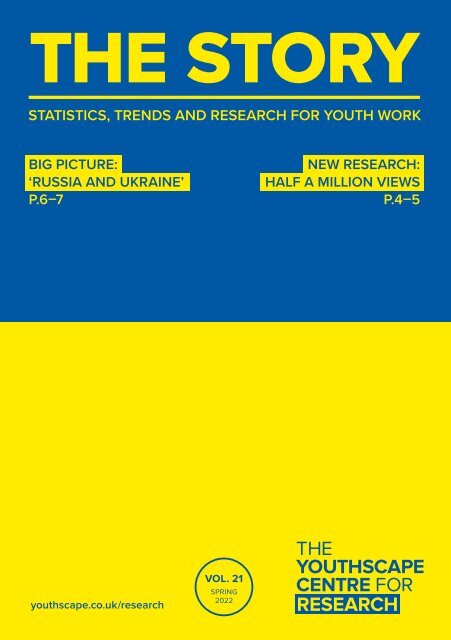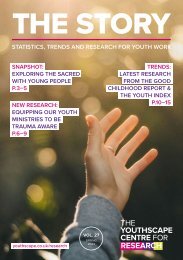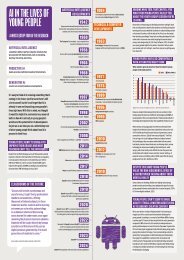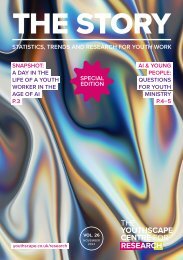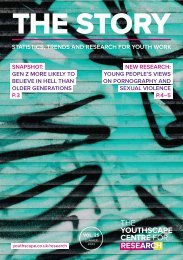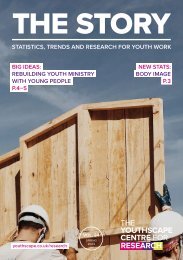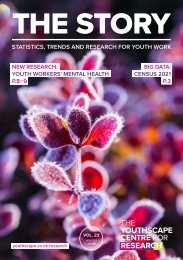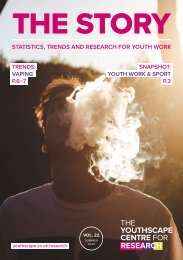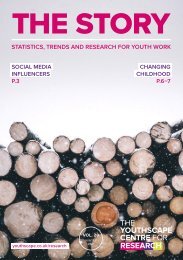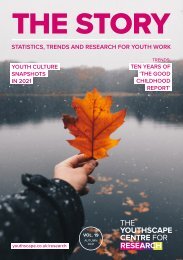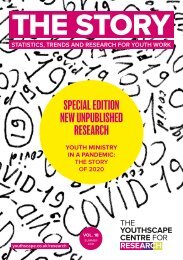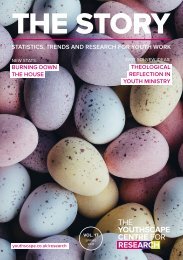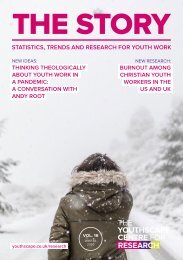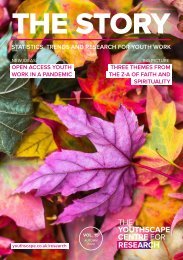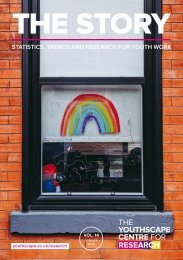The Story Vol 21
The big picture on Russia and Ukraine. Economic precarity for the next generation. Plus findings from 500k young people surveyed on deprivation, education, and aspiration.
The big picture on Russia and Ukraine. Economic precarity for the next generation. Plus findings from 500k young people surveyed on deprivation, education, and aspiration.
Create successful ePaper yourself
Turn your PDF publications into a flip-book with our unique Google optimized e-Paper software.
THE STORY<br />
STATISTICS, TRENDS AND RESEARCH FOR YOUTH WORK<br />
BIG PICTURE:<br />
‘RUSSIA AND UKRAINE’<br />
P.6–7<br />
NEW RESEARCH:<br />
HALF A MILLION VIEWS<br />
P.4–5<br />
youthscape.co.uk/research<br />
VOL. <strong>21</strong><br />
SPRING<br />
2022
WELCOME TO<br />
THE STORY<br />
To be notified about new issues or<br />
subscribe for printed copies visit<br />
www.youthscape.co.uk/research/<br />
the-story<br />
In each issue of <strong>The</strong> <strong>Story</strong> we bring you<br />
some of the latest research related to young<br />
people and youth work. We look for statistics,<br />
research and trends which can shape your<br />
work with young people – informing your<br />
thinking and practice.<br />
As I write, it’s been three weeks since the<br />
Russian invasion of Ukraine. Perhaps a<br />
peaceful resolution has been reached by the<br />
time you read this, perhaps not. Either way,<br />
this conflict is having significant repercussions<br />
around the world. <strong>The</strong>re will undoubtedly be<br />
studies that help us understand how young<br />
people have been and will be affected, but<br />
for now there is very little information beyond<br />
what we hear in the news. We have pulled<br />
together what we could find on young people<br />
and the conflict, on pages 6–7. <strong>The</strong> Children’s<br />
Commissioner for England has published<br />
a survey of over half a million children and<br />
young people, and pages 4–5 highlight some<br />
interesting stats, that we think challenge the<br />
idea that young people with fewer resources<br />
have low aspirations.<br />
On page 3 you’ll find new research on young<br />
people’s financial situation, and don’t forget<br />
to turn to the back page for some curious<br />
correlations we’ve observed in the Youthscape<br />
office as we run up to Easter.<br />
Thanks for reading,<br />
Lucie Shuker<br />
Director of Research, Youthscape<br />
IN THIS ISSUE:<br />
SNAPSHOT:<br />
Generation Precariat<br />
NEW RESEARCH:<br />
Half a million views<br />
BIG PICTURE:<br />
‘Russia and Ukraine’<br />
YOUTH WORK DIAGRAMS:<br />
Curious patterns<br />
EVERYTHING YOU NEED<br />
TO KNOW ABOUT…<br />
DIGITAL WELL-BEING<br />
Research News<br />
P.3<br />
P.4–5<br />
P.6–7<br />
P.8<br />
REVERSE<br />
<strong>The</strong> Centre for Research is partnering with<br />
Youth Alpha, Hope Together, Scripture Union,<br />
Youth for Christ, Church Army and the Church<br />
of England on new research exploring how<br />
young people share faith with their peers.<br />
It should be launched in a few months time,<br />
and we’ll share the findings in our next<br />
edition of <strong>The</strong> <strong>Story</strong>.<br />
P.2
SNAPSHOT: Generation Precariat<br />
As part of the Young people’s future health<br />
and economic security project, the Health<br />
Foundation and the RSA conducted an online<br />
survey of 1178 16–24 year olds (weighted to<br />
be representative by gender and region). <strong>The</strong><br />
survey ran in September/October 20<strong>21</strong>, in<br />
the context of concern about increases in the<br />
cost of living, rising energy prices, the end of<br />
the furlough scheme and just as the Universal<br />
Credit uplift ended. 1<br />
Overall, only 41% of those surveyed believe<br />
they will be able to own their own home in the<br />
future and 51% believe they could earn enough<br />
to support a family or to have a comfortable<br />
retirement.<br />
38% of the 16–18 year olds surveyed are in a<br />
precarious financial position 2 and 39% of 16–18<br />
year olds have access to their own savings.<br />
Those suffering from financial precarity are far<br />
more likely to be concerned about their physical<br />
or mental health and their future, and Black<br />
young people are significantly more likely to be<br />
financially precarious than both white and Asian<br />
young people (70% compared to 47% and 45%<br />
respectively).<br />
Precious, 17 years old:<br />
“A lot of the time wages do not<br />
align with living expenses<br />
making it harder for young people<br />
to save or even have disposable<br />
income as all their money goes to<br />
necessities”.<br />
Angel, 17 years old:<br />
“As a young individual who<br />
resides in [a London borough],<br />
I am aware of the deprivation in<br />
the borough, where employment<br />
opportunities don’t provide the<br />
economic stability needed”.<br />
According to the Office for National Statistics<br />
(ONS), the highest proportion of low-paid workers<br />
by age is among 16–<strong>21</strong>-year-olds, with 59% paid<br />
less than two-thirds of median hourly pay.<br />
National Minimum Wage and National Living Wage<br />
rates from April 2022, by age. 3<br />
23 &<br />
over<br />
National<br />
Living<br />
Wage<br />
<strong>21</strong>–22<br />
18–20<br />
Under<br />
18<br />
National Minimum Wage<br />
Apprentice<br />
Hourly rate<br />
(from April 2022)<br />
£9.50<br />
£9.18<br />
£6.83<br />
£4.81<br />
£4.81<br />
1. <strong>The</strong> scheme had benefited 900,000 16–24 year olds. 2. <strong>21</strong>% just about manage to make ends meet, 6% can’t make ends<br />
meet and 11% say their financial position changes month to month. 3. Source Gov.uk. Note: <strong>The</strong> apprentice rate applies to<br />
those under 19 years old or in their first year of their apprenticeship.<br />
P.3
NEW RESEARCH: Half a million views<br />
<strong>The</strong> Big Ask was an online survey of 4–17 year olds<br />
in England that ran from April to May 20<strong>21</strong>, on behalf<br />
of <strong>The</strong> Children’s Commissioner: 557,077 children<br />
and young people participated, making it the largest<br />
survey of its kind ever to be conducted in England.<br />
Unlike many surveys, data were collected from many<br />
groups that are often under-represented in research<br />
including those from an Irish Traveller/Gypsy<br />
background, those supported by Youth Offending<br />
Teams and children attending special schools.<br />
<strong>The</strong> data here are from 9–17 year olds taking part in the survey.<br />
Young people in the<br />
most deprived areas<br />
are more likely to<br />
prioritise education<br />
but also more likely<br />
to be in inadequate<br />
schools and/or be<br />
unhappy with their<br />
school life.<br />
Overall, 52% said that a having a good<br />
education was one of their top future priorities<br />
but certain groups were more likely to say this.<br />
• Children from the most deprived areas<br />
(57%) compared to those in the most affluent<br />
areas (49%).<br />
• Children from ethnic minority backgrounds<br />
(60%) compared to 49% of white children.<br />
• 58% of children with SEND and 58% of<br />
young carers.<br />
84% of 9–17 year olds were ‘happy’ or ‘okay’<br />
with life at school or college, while 16% were<br />
unhappy.<br />
Children living in more deprived areas or<br />
attending schools rated ‘Inadequate’ were<br />
more likely to be unhappy with life at school,<br />
compared to other children.<br />
P.4
Black and Asian<br />
children and<br />
those in deprived<br />
neighbourhoods are<br />
more likely to prioritise<br />
having a good job/<br />
career in the future.<br />
Having a good job or career was the most<br />
common priority for those surveyed, with 69%<br />
saying this was a priority for when they grow<br />
up. This is even higher among ethnic minority<br />
children and those from a deprived background.<br />
75% of Asian children and 76% of black children<br />
said this was one of their top future priorities,<br />
compared with 68% of white children.<br />
72% of children in the most deprived<br />
neighbourhoods said this, compared with 68%<br />
of children in the most affluent neighbourhoods.<br />
Children in care<br />
Children and young people in care were more<br />
likely than other children to be unhappy with<br />
their family life (14%) compared to 6% of other<br />
children.<br />
<strong>The</strong> top three future aspirations among children<br />
in care were:<br />
1. A good job or career (66%)<br />
2. Enough money to buy the things they need<br />
(60%)<br />
3. Good friends (57%)<br />
Children in care were also more likely to say that<br />
having a nice home in the future is one of their<br />
main aspirations (43%) compared with 36.5% of<br />
those not in care.<br />
<strong>The</strong>y were less likely than other children to<br />
say that a healthy environment and planet is<br />
important for their future (14% vs. 22%).<br />
So what?<br />
Sometimes work with<br />
young people in lowincome<br />
areas is aimed<br />
at ‘raising aspirations’<br />
but these results<br />
suggest these young<br />
people are more likely<br />
than their affluent peers<br />
to prioritise education<br />
and a future career. For<br />
some, it may be less an<br />
issue of low aspirations<br />
and more an issue of<br />
how to achieve their<br />
goals.<br />
P.5
BIG PICTURE: ‘Russia and Ukraine’<br />
At the time of publication we weren’t able to find<br />
any research on how young people in the UK are<br />
responding to the invasion of Ukraine by Russian<br />
forces, but have identified a few pieces of research<br />
that illuminate young people’s views more widely.<br />
<strong>The</strong> political and social<br />
views of young people in<br />
Russia and Ukraine<br />
Comparative surveys of young people in<br />
Ukraine (2017) and in Russia (2019) provide a<br />
sense of their social and political views. While<br />
these are outdated and are likely to be have<br />
been affected by the war, they are still useful in<br />
providing some context. 4<br />
• 49% of young Ukrainians said they didn’t trust<br />
political leaders ‘at all’, and 25% ‘not very much’,<br />
compared with 45% and 26% of young Russians<br />
respectively.<br />
• 72% of young Ukrainians and 75% of young<br />
Russians said they weren’t interested in politics.<br />
However, young Russians were more likely to<br />
have signed petitions and participated in civil<br />
society organisations than their peers in Ukraine.<br />
• When asked if they would be likely to engage<br />
in political activity, 42% of Ukrainian young<br />
people said ‘Not at all’ and a further 25% said<br />
‘Probably not’. <strong>The</strong>se figures were 34% and 29%<br />
respectively, for young Russians.<br />
• <strong>The</strong> level of trust in core state institutions<br />
expressed by young Ukrainians was extremely<br />
low in 2017, with the army receiving the highest,<br />
and political bodies – such as parliament or<br />
the national government – receiving the lowest<br />
scores.<br />
• 50% of young Russians ‘completely agreed’<br />
that ‘there are conflicts in every society that can<br />
only be solved by violence’ compared with 19%<br />
of young Ukrainians.<br />
• 13% of young Russians and 13% of young<br />
Ukrainians either ‘agreed ‘or ‘somewhat agreed’<br />
that ‘my country should accept more refugees’.<br />
• 14% of 14–17 year old Russians saw the<br />
collapse of the Soviet Union as ‘very negative’<br />
compared with 35% of 25–30 year old Russians.<br />
Meanwhile in Ukraine 35% saw the dissolution<br />
as a positive event, and a large percentage<br />
of young people have no clear opinion on the<br />
topic.<br />
• Only 52% of young Russians believed that<br />
relations between Russia and Western Europe<br />
will ever be friendly.<br />
P.6
Germany<br />
In Germany, a survey of 206 13–17 year olds was<br />
conducted on March 2nd and 3rd. It found that<br />
9/10 teenagers were anxious and worried about<br />
the situation in Ukraine. 5 <strong>The</strong>se concerns centred<br />
around two possibilities: first that the conflict<br />
could ‘spill over’ to other countries and second,<br />
that Russia could deploy nuclear weapons.<br />
<strong>The</strong> survey found that, at the start of the month,<br />
most German teenagers were getting most of<br />
their information about the war from parents,<br />
public television, and the websites of mainstream<br />
news services. Those surveyed wanted to hear<br />
news ‘on the ground’ followed by information<br />
about how they could help others their own age<br />
who had to leave their homes.<br />
Voices from young people<br />
affected by the war. 6<br />
“Ukraine and Russia are two of my homelands.<br />
I feel incredible pain, and yet I’m ashamed that<br />
it is so. Because as I’m writing this, my family<br />
is hiding from bombs. I don’t know when I’m<br />
going to see them again.” (Eva, 18, a Russian-<br />
Ukrainian in Spain)<br />
“Throughout the 17 years of my life, I have<br />
lived in Russia, a country that I infinitely love<br />
and will do so in the future. But it is the country<br />
that I love, not its government… <strong>The</strong> Russians<br />
never wanted war. Almost every single one of<br />
us has family or friends in Ukraine, so the news<br />
we woke up to on 24 February was a complete<br />
shock.” (Tamara, 17, Moscow)<br />
Twitter and Insta poll<br />
A short poll was hosted on Twitter and<br />
Instagram in late February 2022, receiving more<br />
than 400,000 responses from 18–34 year olds,<br />
according to the hosts, Pubity. Of those who<br />
took part.<br />
56%<br />
say they would<br />
fight if their<br />
country was<br />
invaded<br />
44%<br />
believe the EU,<br />
UK and US should<br />
get involved in<br />
the Ukraine<br />
war<br />
76%<br />
believe wider<br />
war will<br />
happen<br />
74%<br />
are fearful the<br />
war will impact<br />
their lives<br />
78%<br />
are anxious<br />
about their<br />
future<br />
“Growing up in Kazakhstan, I’ve always felt<br />
a sense of ‘brotherhood’ and familiarity with<br />
the other post-Soviet republics. Only a couple<br />
of decades earlier, we were all one large<br />
country…In Kazakhstan, like any other former<br />
Soviet republic, there is a strong feeling that<br />
the Ukrainian struggle against Russia is going<br />
to define our fate as well, no matter which way<br />
it goes.” (Ilya, 18, Kazakhstan)<br />
4. Félix Krawatzek (2020) Young Worlds? Political and social views of young people in Russia, Ukraine and Belarus. 5. Ukraine-<br />
Russia conflict has German teens terrified. 9th March 2022 https://www.dw.com/en/ukraine-russia-conflict-has-german-teensterrified/a-61069344.<br />
6. ‘This is how teenagers feel about the Russia-Ukraine war’ 15th March 2022. https://www.opendemocracy.<br />
net/en/odr/how-teenagers-feel-russia-invasion-ukraine/<br />
P.7
YOUTH WORK DIAGRAMS<br />
Curious patterns<br />
Units of coffee consumed<br />
Incidences of anti-social behaviour<br />
An inverse correlation<br />
has been observed in<br />
YS towers, whereby<br />
the quantity of coffee,<br />
chocolate, snacks<br />
consumed declines,<br />
just as the number of<br />
passive aggressive<br />
comments and general<br />
hangry vibes appears to<br />
be on the rise.<br />
Correlation?<br />
Causation?<br />
Who can say…<br />
5<br />
4<br />
3<br />
2<br />
1<br />
0<br />
0 1 2 3 4 5 6<br />
WEEKS OF LENT<br />
For more #youthworkdiagrams follow us on Twitter @YWresearch<br />
IMAGINE THAT<br />
Bute Mills, 74 Bute Street,<br />
Luton, LU1 2EY<br />
hello@youthscape.co.uk<br />
01582 877220<br />
Registered charity no. 1081754.<br />
Registered company no. 3939801<br />
registered in England, a company<br />
limited by guarantee.<br />
<strong>The</strong> 2022 Youthscape/St Mellitus lecture is now available<br />
to watch and listen to at the Youthscape Store. This was<br />
Dr Sara Schumacher, reflecting on the role of imagination<br />
in youth work.<br />
“Young people have the potential to lead us back to an<br />
embrace of the imagination… What they see, what they<br />
say, what they desire may not always be a problem to<br />
solve. Instead, it can be an opportunity to see the world<br />
that could be through their eyes.”<br />
P.8


